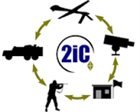News
 “Lean” is a word that seems to be at the heart of Little British Battler 2iC’s ethos. The company, which develops digital interoperability software, and has initially focused on delivering the power of enterprise middleware software to challenging technical environments such as the battlefield, has three direct employees: Graham Booth, the CEO and co-founder; Nick Peach, CTO and co-founder; and Chris Roberts, Sales Director. All other functions are outsourced: an outsourced CFO, ‘The Invisible Assistant’ for all things admin, and numerous IT providers including AVCO Systems and Diegesis. In addition, 2iC has built up a partner network consisting of Tier 2 and 3 specialist companies, such as 4Secure, previous LBB Deep-Secure, Exsel Dytecna and Nexor.
“Lean” is a word that seems to be at the heart of Little British Battler 2iC’s ethos. The company, which develops digital interoperability software, and has initially focused on delivering the power of enterprise middleware software to challenging technical environments such as the battlefield, has three direct employees: Graham Booth, the CEO and co-founder; Nick Peach, CTO and co-founder; and Chris Roberts, Sales Director. All other functions are outsourced: an outsourced CFO, ‘The Invisible Assistant’ for all things admin, and numerous IT providers including AVCO Systems and Diegesis. In addition, 2iC has built up a partner network consisting of Tier 2 and 3 specialist companies, such as 4Secure, previous LBB Deep-Secure, Exsel Dytecna and Nexor.
2iC was founded in 2010, focusing on the Army in the early days; it undertook a soft market trial of its offering in 2011, then in 2012 embarked on a ‘Proof of Concept (PoC)’ backed by seed investors. But it wasn’t until 2014 that it started to sell. The big news was 2iC’s selection for the MoD’s Man Worn Power and Data 2 (MWPD2) programme, focused on developing future soldier capability for British land forces. 2iC delivered into the large trial environment in October 2014. Its Lean Services Software  Development Kit (SDK) is being used to expose the systems attached to the soldier’s vest in an open way. Its Decentralised Operating Procedures (DOP) are then used to steer the information between soldiers, vehicles and any future platforms connected to the network. This year, the MoD has agreed to fund a full demonstrator.
Development Kit (SDK) is being used to expose the systems attached to the soldier’s vest in an open way. Its Decentralised Operating Procedures (DOP) are then used to steer the information between soldiers, vehicles and any future platforms connected to the network. This year, the MoD has agreed to fund a full demonstrator.
The potential for 2iC to grow its business off the back of the MoD’s Future Soldier programme, working directly with the MoD, and with defence contractors such as Ultra Electronics, is significant. But 2iC’s ambitions go much further. The UK defence market is just for starters. 2iC is also intent on spinning out into other areas with similar ‘Internet of Things’ challenges such as health, transport or energy, as well as into the US market. But it has no desire to change its current ultra-lean operating model!
Posted by Georgina O'Toole at '09:01'
- Tagged:
defence
SI
iot
« Back to previous page